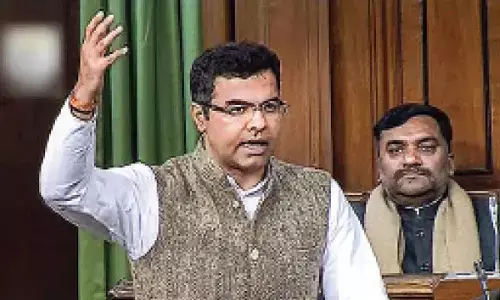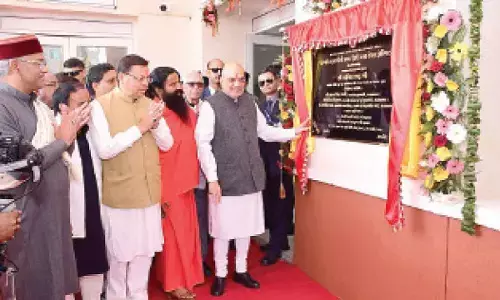New politics in India
New politics in India, Nilotpal Basu, new politics, Aam Aadmi Party. But it will be a mistake to think that the emergence of this variety of politics is an autonomous indigenous development – here in India.
A new notion has gate-crashed into the contemporary lexicon of public discourse. However, this notion remains tantalisingly evasive; nebulous and devoid of clarity. But mainstream media seems to have latched on to this – ‘new politics’. And this poses another post modern intrusion as much as the other notion of ‘political class’ which is very much in vogue.
Once contextualised-and in sequence-it becomes abundantly clear they are aimed at obfuscating the real nature of politics; and more importantly the linkage with policy and what policy holds for different sections of people representing diverse economic and social interests.
But it will be a mistake to think that the emergence of this variety of politics is an autonomous indigenous development – here in India. It indeed has a global context. The elements which have been gathering ground since the onset of globalisation--and together with it the unravelling of neo-liberal policies; but it has come to assume a pronounced conspicuous crescendo after global financial meltdown and the subsequent recession.
The response of the ruling elite in various parts of the world have been varied depending on the nature and level of development of the respective societies and economies; much as the diversity of neo liberal regimes themselves, which however maintained a consistency in their thematic essentials. With the meltdown and recession, Finance sought to cling to its ideological hegemony despite the fact that the policy package was increasingly bereft of credibility and of course, sustainability.
This conflict and asymmetry has been most pronounced in Europe where the impact of the crisis on the lives of the people has been most severe. The real nature of the ‘austerity’ measures in different parts of Europe became so obvious that these were immediately identified as unmistakably right wing. The likely outcome would not have been difficult to anticipate; conducive ground for the opening up of a left-wing shift.
Of course, there was another distinct possibility; assertion of an aggressive identity politics to disarray a policy direction driven political change. But, in less diverse environs that also did not seem to work very effectively; hence new politics.
The context of its genesis set out the ground for the broad content and direction of this new phenomenon. Its main function remains in deideologising politics; to bring about a breach between the issues and concerns it articulated and their necessary interconnection with policy questions. Obviously, it never spoke of changing the extant policy trajectory which, in the first place, might have been responsible for the concerns they were forced to articulate.
Given the background of contemporary neo liberal capitalism, we have witnessed throughout the Nineties and most of the first decade of the millennium a right wing shift in politics, not only did the conservatives thrived, but even the left of the centre social-democrats followed suit. Most of Europe was testimony to such a rightward movement in the politics of the Establishment.
In this background, how would the people-lending ‘Occupy Wall Street’ expression-the 99% speak out? There was a great likelihood of the 99% discovering the policy roots which prompted their pathetic circumstances. It is this context which prompted the contours of new politics. Therefore, the defining feature of this new politics was to articulate the woes and agonies of the majority, while keeping the collective protests of the people unlinked to policy regime change.
A major form of this politics was to confine in not just attacking the right; but also to hit out against politics of any kind which was hitherto in currency. With the magnitude of frustration prevailing among the people, new politics thrived managing a degree of popular support, despite the often bizarre articulation. A classic example was in Italy where a Party led by a popular comedian ended in garnering support of a fourth of the population by lampooning the traditional political forces.
It is that overall background that must sensitise our awareness about emergence of new politics in India. India has also traversed through a similar experience. Twin assault of Hindutva and Neo liberalism have undermined left of the centre space in Indian politics throughout the Nineties reaching its pinnacle with NDA assuming power eventually culminating in the Gujarat genocide.
The fight back led to the left gaining ground in 2004 and UPA replacing the NDA in unexpected circumstance. This led to an alarmist response from the right both domestically and internationally- finally leading to the left’s setback. But since 2009, the new global conjuncture created conditions which brought in an element of desperation among the right to pursue its right wing policies in sharp contrast to the relative inhibitions injected by the left.
The resultant consolidation of the right reflected in the deteriorating conditions of the people; unemployment, inequality, growing poverty and of course, corruption on a massive scale has led to alienation and disillusionment.
As much as the far right is aiming to exploit this conjuncture, a policy alternative is sought to be undermined. This is accompanied by a strong assertion of new politics. The principal question around which this happened was corruption of a humongous proportion, particularly so when corporate complicity in influencing decisions came to be exposed.
While it was clear that this arose out of the systemic characteristics of the neo liberal paradigm, the formal outbreak of new politics with the civil society movement for Jan Lokpal led by Anna Hazare brought the issue of corruption to the centre stage of public discourse. This intervention brought together NGOs – agencies of new politics-under the broad platform of ‘India against corruption’.
However, typical of global new politics, Jan Lokpal movement concentrated on government and established parties regardless of their political-ideological orientation; remaining largely silent on the role of the nexus where the corporates played a crucial role in engineering the huge scams. It was also significant that mainstream media which had otherwise come to be totally driven by corporates seemed to be encouraging this new brand of politics.
New politics in the country, however, took a decisive turn with Arvind Kejriwal breaking ranks from IAC and formally launching the Aam Aadmi Party to take on the parties associated with the ruling dispensation. Significantly, AAP did not differentiate between parties and their respective orientation; in the process, obscuring the contribution of outfits fighting corruption, especially the left. Their emphasis was on new politics, underlining their thrust on deideologising politics; one ideologue stressing that traditional right-left divide has become historically irrelevant. Flowing from this understanding, they have refused cooperation with any other political force.
Doubtlessly they have captured the imagination of a section of the people. AAP have been publicly perceived with some degree of credibility- as was seen in Delhi Assembly elections- as alternative to both Congress and BJP.
But again, they seemed to be reluctant to spell out their policy preferences. But having registered their presence-reinforced by electoral support-it is becoming difficult for them to be evasive. Forced by circumstances, Kejriwal observed that AAP is opposed to cronyism-but not capitalism. He reiterated the Thatcherite neo liberal doctrine-“Government has no business in business”. Yogendra Yadav rejected the need for subsidy or nationalisation of natural resources.
Where does this take Indian new politics? Can it be seen as a change agent against neo liberalism induced corruption and other deprivations of the Aam Aadmi? Given its context and content, one cannot but be sceptical.

















